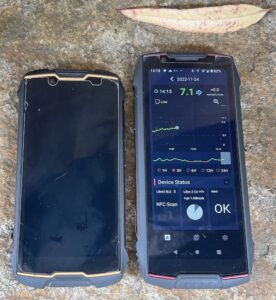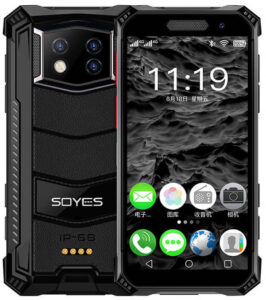In my recent “Pancreas phone” options post I listed some of the small Android phones people have been using for diabetes management lately. This post is a brief update on that.
Cubot KingKong Mini 3
I mentioned the KingKong Mini 3 and Pocket 3 models (which seem to share the same internals, just with the KKM3 favouring rugged over style) with the proviso that they were so new that no-one had experience with them yet. But since then phones started appearing, and I’ve been putting the KKM3 through its paces. A few observations:
 It is a little bigger than the KKM2 and KKM2 Pro, both in thickness and length. Still reasonable though (slightly smaller than my iPhone 12 mini).
It is a little bigger than the KKM2 and KKM2 Pro, both in thickness and length. Still reasonable though (slightly smaller than my iPhone 12 mini).
In this photo it’s beside my old backup KKM2 (which is identical in size to the KKM2 Pro.
The battery life is great. It certainly lasts into a second day.
The phone has NFC, and unlike the earlier Cubot Pocket this one will talk to Libre sensors. Using the regular LibreLink app from the Play Store, it initialises and communicates with both Libre 1 and Libre 2 sensors. Right now I have Diabox on the phone tracking a Libre 2 sensor via Bluetooth. It’s interesting to compare the results with my G6 sensors, but I don’t think I’m tempted to move.
Soyes S10 Max
 A comment on that last post was from someone using this even-smaller phone. It seems decently small, and also claims to be waterproof. I don’t have any direct experience with it, but note two things:
A comment on that last post was from someone using this even-smaller phone. It seems decently small, and also claims to be waterproof. I don’t have any direct experience with it, but note two things:
- It’s currently more expensive than the Cubot options.
- It uses Android 10, which is what the KKM2 from 2020 used. It is still a decent version (although I find there were some significant Bluetooth improvements in Android 11).
But it may interest some people.
Which is my favourite?
I like my devices to be “life-proof”, and my life sometimes involves rainstorms and watersports, so that narrows the choices a bit. If I was shopping today for a small rugged device to run my CGM and closed-loop system I would probably get either the KingKong Mini 2 Pro or the KingKong Mini 3.
Apart from differences in price (which can change as deals come and go) I see the main differences as:
- KKM2 Pro runs Android 11 and is physically smaller.
- KKM3 runs Android 12 and can use Libre sensors (for what that’s worth).
The older KKM2 and the Pocket are both decent phones, although neither is waterproof and the KKM2 runs the older Android 10 (and has Bluetooth 4 instead of 5, which seems to cause issues communicating with the DANA-i pump if that’s relevant).

Thanks for the post. It’s a shame that the smaller Cubot Pocket isn’t Libre compatible but at least the KKM3 is. Really want a small device that’s sole purpose is to run xDrip (or DiaBox), I’ll definitely have to give the KKM3 a go in the new year (already spent too much for Christmas).
Ideally I just want a device that I can hook to my trouser loop (via a carabiner) so that I don’t forget to bring my phone with me everywhere. Not sure how I would achieve that since there aren’t many cases for these devices and non of them have a loop for a carabiner attachment (might have to DIY it maybe).
Definitely going to add your RSS feed to my feed list to see your future posts.
The KKM3 does have a loop through the metal casing to accommodate a lanyard, but that’s not quite the same as a carabiner.
Are you able to provide photos of this loop on the device? Can’t see anything in the promotional photos, I can see in the promo video the model snaps the phone to his wrist but it doesn’t really show how or what accessory was used to achieve that.
Oh I see. Where the loop is situated is it made of metal? Do you think the device would be too big to hang around your neck on a lanyard?
That’s the upper right corner. Yes it’s part of the phone’s metal frame.
You can look up the dimensions and weight at the manufacturer’s site so you can decide for yourself if that would be too big.
Would not be convenient for me.
David, do you know if the Soyes S10 Max has the ‘good’ NFC to interact with Libre sensors?
No idea. Have never used one, and haven’t heard that detail from people who have.
The Soyes S10 gives excellent battery life, never ran out of charge, (used without SIM), WiFi always on and Nightscout uploading non-stop. Bluetooth connection via Dexcom and AndroidAPS was flawless and never dropped out. Was surprised it worked so well, it has stock Android with no extras too.
I find that the KKM2 loses Bluetooth signal with my omnipod dash when I go to busy places (football stadium or gig). Would the KKM2 Pro be a better choice, I hadn’t heard of this before?
The KKM2 Pro runs Android 11, which can be a little more solid in the Bluetooth department than the KKM2’s Android 10. But no, once the Bluetooth traffic gets really congested the only thing that can really help is keeping the phone close to the pod so the radio signal will be as strong as possible and drown out the interference.
I haven’t noticed a significant difference in their signal strength.
Are there any small, waterproof phones with Android 11 or higher that are compatible with the 4G bands used in the US? US carriers are actively discontinuing support for anything older than 3G. I’m also thinking about a “pancreas phone”, and I’m not sure whether I’d actually get cell service or use it WiFi only, but it’d be nice not to be limited by the hardware. Although 3000 mAh is *crazy* high battery capacity for a small phone, and I doubt anything that works with US 4G will get close to that, so the KKM2 Pro and KKM3 are going to be tough to match overall…
No I haven’t identified any. It’s been years since I was visiting the US, so it hasn’t been a high personal priority. But when I’ve looked I haven’t seen any likely candidates.
My own KKM3 runs for about 2 days, so forgetting to charge each night is not a show-stopper. It’s very convenient.
Hmm… on further thought, is a cellular connection actually *necessary * for a pancreas phone? Yes, it wouldn’t be able to back up data continuously, but it seems like all the looping bits need to work purely locally or they wouldn’t be reliable enough anyway. And for backups, WiFi at home and work, plus the option of tethering to another phone with a cellular connection if going to be away from those for an extended period, seems good enough. Battery life should actually be *improved* by not using a cellular connection…
You’re right.
A well-configured system should NOT rely on permanent connectivity to the Internet.
Sure having continual data uploads is convenient, but access to the Internet is not guaranteed. If I’m riding my bike and go into a “mobile blackspot” I don’t want my AID system to stop working. I do NOT want my CGM alarms to stop, I want the CGM details on my watch to keep up to date, etc.
Yes many people do not put a SIM in their pancreas phones, and the software just automatically buffers the data for later upload via WiFi.
If I’m in outback Australia or at sea it can be days/weeks before I get another connection, but everything has to stay working.
Sure no-one else can monitor me remotely in real time, but for me that’s classed as a non-essential function.
I’m about to be upgraded to the Ypsomed myLife Loop but am a dyed in the wool iPhone user. Currently the Ypsomed version of CAMSaps is Android only (with no info on an iOS version I can find), so I am looking to buy a “Pancreas Phone”. Ypsomed state that compatibility is the same as the Dexcom G6 which only lists LG, Samsung, Google, Motorola and Huawei phones. Does that mean the options in this article are not valid for me? What would you recommend? I will only use this device for my loop and do not plan on adding a SIM. Size and battery life are my main concerns, it does not need to be waterproof. Thanks
Ypsomed’s official answer re support is they support anything the Dexcom supports.
Dexcom’s software is picky about which machines it will run on.
But the CamAPS FX software doesn’t actually care.
They are about to introduce some new “device integrity checks” as part of their Play Store deployment which may restrict which phones it will run on, and the app now has that check available in its Help menu. The KingKong Mini 2 Pro and KingKong Mini 3 both pass this test.
That’s about all I can tell you, other than because these phones are not officially supported by Dexcom that does provide Ypsomed’s support people an easy and obvious excuse if your phone DOES have a technical issue. But lots of people are using those phones with CamAPS.